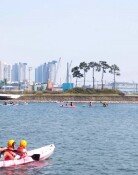Korea Has OECDs Lowest FDI-to-GDP Ratio
Korea Has OECDs Lowest FDI-to-GDP Ratio
Posted September. 10, 2008 03:28,
Korea last year had the worst ratio of foreign direct investment to gross domestic product among member nations of the Organization for Economic Cooperation and Development.
According to a joint analysis conducted by The Dong-A Ilbo and the Korea Chamber of Commerce and Industry, Koreas GDP was 705.6 billion U.S. dollars and FDI was 1.6 billion dollars last year.
The FDI-to-GDP ratio was thus 0.23 percent, a far cry from the OECD average of 4.56 percent.
Luxembourg by far had the highest ratio of 440 percent, followed by Iceland (32.75 percent); the Netherlands (22.82 percent); Ireland (18.34 percent); Belgium (14.73 percent); Switzerland (14.21 percent); Austria (13.87 percent); Canada (12.38 percent); the Czech Republic (11.72 percent); and the United Kingdom (10.7 percent).
Luxembourgs top ranking was due to its small economy, relatively low GDP of 27 billion dollars, and tax breaks for foreign investors.
Among OECD member nations, Spain had a GDP of 735.3 billion dollars and Mexico 686.8 billion dollars last year, similar to Koreas. Spain, however, had a FDI-to-GDP ratio of 7.26 and Mexico 3.37 percent.
Chamber managing director Lee Hyeon-seok said, The prospects for FDI in Korea are not rosy this year. In the first quarter, FDI jumped 35 percent from the previous year but dropped four percent from a year ago in the second quarter. Along with falling domestic investment, sluggish foreign investment could hamper Koreas economic growth.
Experts blamed rigid labor-management relations and high costs as obstacles to drawing foreign investment.
For example, when a French cement manufacturer closed its factories in Korea, employees at the companys Korean suppliers rushed to its Paris headquarters and waged a protest, demanding employment succession.
A source from a foreign economic organization said, The National Labor Relations Commission ruled that the French company was not responsible for employment succession. Yet employees from the companys Korean suppliers waged a protest in front of its headquarters in Paris. That gives the impression that Korea is not a business-friendly nation.
In a discussion with leaders of the ruling Grand National Party, Korean Employers Federation Chairman Lee Soo-young said, Korea cannot come up with effective measures to attract foreign investment unless it improves rigid labor-management relations characterized by militant unions.
Other obstacles to drawing foreign investment cited were expensive rent and labor costs; heavy regulation in the Seoul metropolitan area; and outdated rules such as mandatory employment of national honorees.
To draw more foreign investment, the analysis said Korea needs to improve elements of the living environment such as education. In 2006, tuition at an international school in Seoul cost between 23,390 and 28,378 dollars per year, considerably higher than in Hong Kong (9,70812,085 dollars), Singapore (20,58423,327 dollars), Japan (21,23022,409 dollars) and China (21,68023,180 dollars).
Lee Gyu-nam, head of the foreign investment difficulty support team at the Korea Trade-Investment Promotion Agency, said, The automated answering systems at financial institutions and administrative agencies are in Korean only. If Korea wants to attract foreign investors, policies are needed to make the impression that Korea warmly welcomes foreign investment.
abc@donga.com







